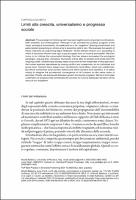Chapter Limiti alla crescita, universalismo e progresso sociale
Author(s)
Bellanca, Nicolò
Pardi, Luca
Language
ItalianAbstract
The paradigm of limits to growth has been legitimized by important contributions, both scientific and philosophical. Although it has oriented the political program of the major ecological movements, its weakness is to be "negative" (placing constraints) and paternalistic (preaching to others what it would be right to do). We evaluate the weight of these criticisms by examining Ingrid Robeyns' recent refined version of it, according to which it would be efficient and right to put an upper limit on income and wealth. We then move on to criticize the universalist ideology that has always permeated the ecological paradigm, arguing that, ultimately, Humanity will be able to awaken and jointly face the ongoing crises. Evolutionary biology helps to account for the weakness of this approach: the human species reproduces by mixing conflict and cooperation on an individual and group level. Humans have always been divided into many tribes, which can collaborate, but which sometimes exist as they defend and affirm borders and identities. It is rather empty to imagine the ecumenical convergence of all humans on the same order of priorities. Finally, we distinguish between growth and social progress. We try to formulate a definition of progress that constitutes the premise for a more adequate narration of the story of our biosphere.


 Download
Download Web Shop
Web Shop